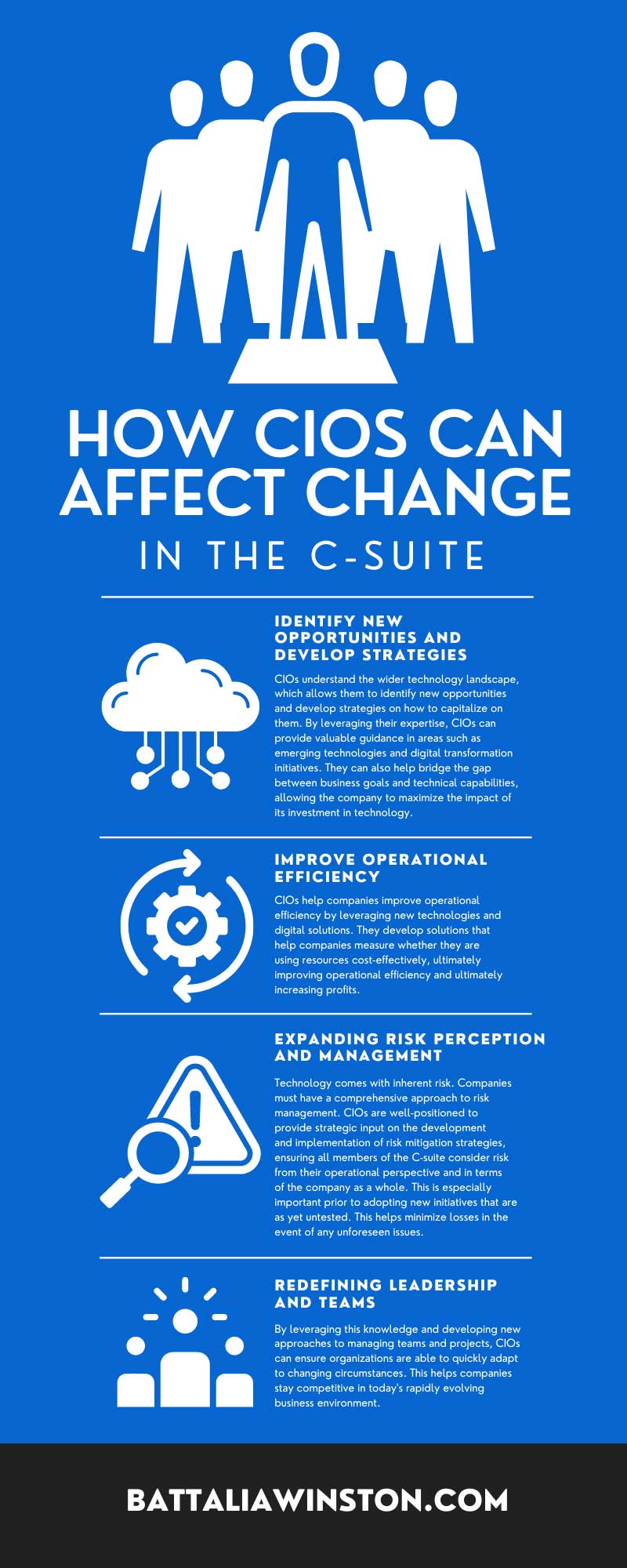The C-suite is the collective term for a group of highly influential executives in an organization. As technology becomes increasingly integral to a company’s operations, the role of the CIO is of paramount importance.
CIOs can affect change in the C-suite through their deep understanding of technology and its impact on an organization as a whole. Learn more about how CIOs can use their skills and expertise to drive positive change within the C-suite.
What CIOs Do
A CIO’s primary responsibility is to manage a company’s technology infrastructure and services. This includes networking, hardware, software, cloud computing, storage, and security systems. CIOs also understand the broader technology landscape and how it can be leveraged to create competitive advantages. As such, they are well-positioned to drive innovation within the company and provide strategic guidance on technology-related matters.
Moreover, CIOs have an important role in managing the implementation of new technologies within the organization. They ensure any new or upgraded system meets user needs, adheres to security protocols, and demonstrates reliability under heavy use. CIOs control technology costs while simultaneously improving efficiency and user experience. Through their expertise, CIOs are able to leverage technology use to increase profitability. This is an invaluable asset to any organization looking to stay competitive in today’s fast-paced business environment.
Finally, CIOs can provide strategic insight into how technology solutions can address specific business objectives. They have a unique ability to spot opportunities in emerging technologies and identify potential risks. By leveraging their deep technical knowledge, CIOs can provide invaluable input into the development of new products and services that will give a company a competitive edge in the market. Here’s a deeper look at how CIOs can affect change in the C-suite.
Rebranding IT From a Cost Center to a Revenue Generator
The traditional view of IT departments is that they are a cost center, providing essential services but not generating any profits. CIOs can help shift this perception by demonstrating how technology solutions can generate revenue. By leveraging data analytics and promoting the adoption of organization-wide, efficient, user-friendly technical platforms, CIOs can affect the development of new products and services that have the potential to generate substantial profits for the company.
Identify New Opportunities and Develop Strategies
CIOs understand the wider technology landscape, which allows them to identify new opportunities and develop strategies on how to capitalize on them. By leveraging their expertise, CIOs can provide valuable guidance in areas such as emerging technologies and digital transformation initiatives. They can also help bridge the gap between business goals and technical capabilities, allowing the company to maximize the impact of its investment in technology.
Improve Operational Efficiency
CIOs help companies improve operational efficiency by leveraging new technologies and digital solutions. They develop solutions that help companies measure whether they are using resources cost-effectively, ultimately improving operational efficiency and ultimately increasing profits.
Expanding Risk Perception and Management
Technology comes with inherent risk. Companies must have a comprehensive approach to risk management. CIOs are well-positioned to provide strategic input on the development and implementation of risk mitigation strategies, ensuring all members of the C-suite consider risk from their operational perspective and in terms of the company as a whole. This is especially important prior to adopting new initiatives that are as yet untested. This helps minimize losses in the event of any unforeseen issues.
Redefining Leadership and Teams
CIOs can also help redefine leadership and teams within the organization. They have a unique understanding of how technology impacts people, processes, and systems. By redefining a team as the group of individuals needed to complete a project, regardless of what department they’re from or who they typically report to, CIOs can forge teams that tackle urgent projects with a comprehensive approach.
By leveraging this knowledge and developing new approaches to managing teams and projects, CIOs can ensure organizations are able to quickly adapt to changing circumstances. This helps companies stay competitive in today’s rapidly evolving business environment.
Transformational and Strategic Thinking About Technology Platforms
The C-suite is responsible for setting the overall direction of an organization. As such, CIOs have a responsibility to provide transformational and strategic thinking about technology platforms. They provide valuable input into new products and services that will give the company a competitive edge in the market.
Taking an organization-wide view of technology rather than a siloed IT department view allows CIOs to drive cultural change toward enterprise technology. These changes can improve and coordinate areas as seemingly disparate as customer experience, data storage, security, analytics, human resources, marketing, and more.
Inspiring a Sense of Urgency
CIOs have the unique ability to inspire a sense of urgency within their teams. By leveraging their technical expertise and knowledge of the wider technology landscape, they can ensure their company stays ahead of major advances in technology, such as the explosive growth of AI apps.
Driving Acceptance of a Hybrid Workplace
The COVID-19 pandemic has completely transformed the way we work. Companies are relying on technology more than ever to enable remote work and collaboration. As such, it is essential that CIOs take a proactive role in driving the acceptance of a hybrid workplace. CIOs can manage this transition by developing and implementing strategies that ensure the security, reliability, and cost-effectiveness of remote working solutions.
Finding the CIO Who Can Transform the C-Suite
In order for a CIO to maximize the potential of technology investments and drive change within the C-suite, it is essential that a CIO be a good fit with company culture. They must also have the skillset and experience that can transform operations quickly.
A professional executive search firm can help find the right individuals to fill these roles. Executive recruiters provide tailored services that ensure organizations find the most suitable candidate for their needs. A good executive search firm will not only identify potential candidates but also conduct detailed interviews and confidential reference checks to ensure the CIO will be a good fit for the organization and that they’ll last in the position.
By engaging a specialized technology executive search firm to hire a CIO, companies can ensure they find the right person to drive necessary change and development, advance company goals, drive improvements, and build new revenue streams. The right CIO can help drive transformational change within the C-suite, helping to ensure companies stay ahead of their competition.
Through their deep understanding of technology and its impact on an organization, CIOs are well-positioned to drive innovation, improve operational efficiency, provide strategic insights into new opportunities, and mitigate risks. CIOs can bridge the gap between business goals and technical capabilities. Ultimately, CIOs can be a major force for positive change within the C-suite.



